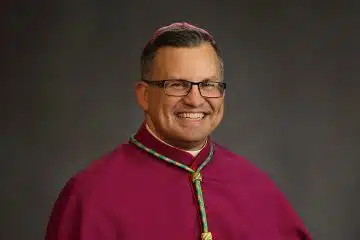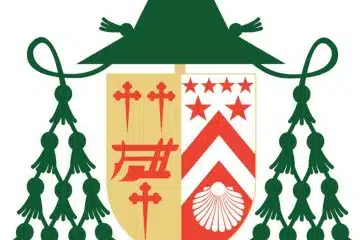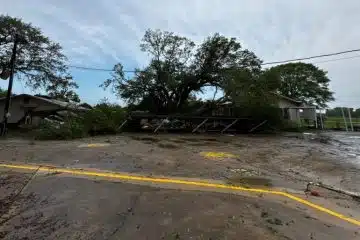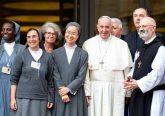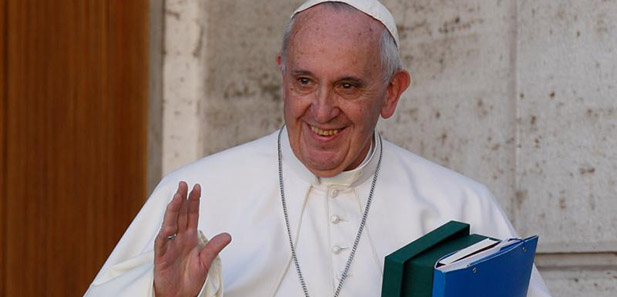Synod working document expands scope of family issues, pastoral needs
By Laura Ieraci Catholic News Service
VATICAN CITY — The working document, intended to guide discussions at the Synod of Bishops on the family in October, included a much wider array of issues affecting the family than were in the final document released after the extraordinary synod last year.
Last year’s “relatio” had 62 paragraphs; the new working document, issued at the Vatican June 23, had 147.
While some issues addressed in the “relatio” were expanded upon, more than a dozen others were entirely new and also based in the lived experiences of families, such as poverty, infertility, ecological degradation, bioethics, the role of women, the role of grandparents, aging, loss, disability, migration, prayer and fear of commitment.
The elaboration of many of these themes was drawn from the recent catecheses of Pope Francis on the family, which he has been giving at his weekly general audiences since December. Other points drew on his apostolic exhortation, “The Joy of the Gospel,” and other speeches he has given.
On the issue of poverty, the working document noted “concrete family life is strictly linked with economic reality.” Rooted in the practical, it cited insufficient wages, unemployment and financial insecurity, lack of dignified work, job insecurity, human trafficking and slave labor as the “most relevant problems” facing families in the area of economics. The document said children suffer the greatest impact of these problems and called for “a structural change” in society, aimed at creating equality.
The document also cited “social contradictions,” where the lack of sufficient social and economic policies, even in welfare states, leads to the impoverishment of many families, resulting in various forms of social exclusion and an increase in gambling, alcoholism and drug addiction.
On women, the document said the condition and status of women are not consistent from culture to culture. In developing countries, women continue to be exploited and subjected to different forms of violence, including forced abortions and sterilizations or, at the other end of the spectrum, “wombs for rent” for surrogate motherhood, the document said.
In developed countries, it said, “women’s emancipation” has led women to renegotiating their roles in the family, but also to their desire to have a child “at any cost,” which has “aggravated” the “inequality between men and women.”
In a separate sub-section on “cultural contradictions,” the document cited conflicting forms of feminism: one that sees “maternity as a pretext for the exploitation of the woman and an obstacle to her full realization” and one that sees having a child as a “tool for self-affirmation, to obtain by any means.” Citing Pope Francis, the document noted the need to develop a “better understanding” of sexual difference.
The document acknowledged that a greater role for women in the church in decision-making processes, in “the governance of certain (church) institutions” and in the formation of priests “can contribute to the recognition of the decisive role of women.”
Aging, widowhood and death were also new to the document. The aging process and the “golden years” of a person’s life must be valued anew, said the document.
Recognizing the loneliness experienced by many elderly, the document said they must be more appreciated. Grandparents in particular have the important function of offering their children and grandchildren support, a witness of faith and a sense of their roots.
On the experience of loss, the document said some widows and widowers are able to take on an “educative mission” with their children and grandchildren and experience a renewed sense of purpose in life. But such is not the case for all widows and widowers, who need the support of a Christian community, the document said. The document also noted how the loss of a child can tear families apart.
Migration, and all of the traumas, cultural adjustments and losses associated with it, has also wreaked havoc on families, the working document said. Migrant families require specific pastoral care that takes these aspects into consideration. Many families flee from war and violence, embarking on treacherous journeys to reach safety. Other situations require family members to spend long periods of time apart until they can finally be reunited.
Families that have members with a disability are challenged not only by the disability, but also by the social stigma and the concern about how their loved one will be cared for once the main caregivers die, the document said, as it encouraged communities to be more welcoming of people with disabilities.
The document recognized that infertility is a suffering for some married couples and called for more pastoral care for couples who cannot have biological children.
The document also noted a number of ecological issues that pose challenges to families, including a lack of access to clean water and the degradation of arable land for cultivation.
Posted June 24, 2015





